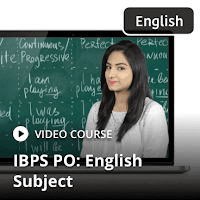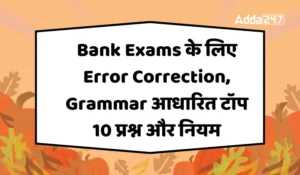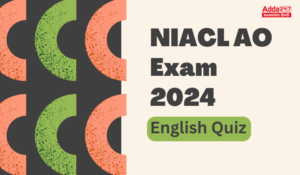SBI PO Main- English Miscellaneous Quiz
State bank of India's probationary Officer's prelims was held on the 8th and 9th of June. Students gave the exam with great enthusiasm and we also hope that you have done well. Prelims will be followed by the mains, and the date is already scheduled for 20 July this year. We know you all are full of optimism and expect your name in the cut-off list of prelims. Here is a quiz on English Language being provided by Adda247 for free to let you practice the best of latest pattern English Questions for SBI PO Examination 2019-20 so that you can make sure that this year's PO is in your pocket. With this, we wish you all the very best for the results of prelims. Keep the preparation engines running.
Directions (1-5): Read the following passage carefully and answer the questions given below it. Certain words have been printed in bold to help you to locate them while answering some of the questions
The freight train from China that pulled into Tehran a little over a month ago created history by becoming the first train to revive the ancient Silk Route between China and Iran. Ferrying 32 containers of cargo, it left Yiwu in China’s eastern Zhejiang province on January 2, snaking its way through Kazakhstan and Turkmenistan before entering Iran. It took the train 14 days to cover the roughly 10,399 km long journey to Tehran.
Part of the overland component of China’s One Belt, One Road (OBOR) initiative, the Yiwu-Tehran rail link slashes travel time between China’s east coast and Iran. Its arrival “in less than 14 days is unprecedented,” the head of the Iran Railways company Mohsen Pourseyyed Aqai said. Ferrying cargo via the sea from Shanghai, which lies 300 km north of Yiwu, to the Iranian port of Bandar Abbas takes 45 days in comparison.
The China-Iran “Silk Road train” will run once a month. Its frequency will increase as trade picks up. China’s economic co-operation with Iran, which deepened through the sanctions period – bilateral trade grew from $4 billion in 2003 to $53 billion in 2013 is expected to soar in the coming years as Beijing and Tehran are eyeing stronger trade ties. In January, during the visit of Chinese President Xi Jinping to Iran, the two sides agreed to increase trade to $600 billion over the coming decade.
The train from Yiwu used existing rail links to run to Iran. China proposes to build new high-speed rail links through Central Asia. Trains carrying Chinese goods will then not terminate at Tehran but run further on to European markets. Besides facilitating Sino-Iran trade, these rail lines will contribute to Iran’s emergence as an important Eurasian trade hub. They will generate income for Iran from transiting trains and integrate it more firmly into the economies of East and Central Asia as well as Europe.
The Yiwu-Tehran train underscores China’s plans for regional integration “with Central Asia as the main hub,” Aryaman Bhatnagar, policy advisor, Peace & Security Programme at Friedrich Ebert Stiftung–India told The Diplomat, drawing attention to China’s significant investment “in both Iran and the Central Asian region for years, especially in the infrastructure sector.”This investment in internal and trans-border road and rail connectivity has resulted in a massive network that connects China with different parts of Asia and Europe. There is, for instance, the roughly 13,000 km-long railway line – the world’s longest – linking Yiwu with Madrid.
Thus the Yiwu-Tehran railway is “just one of the many projects that enhance regional connectivity, bringing together China, Central Asia, the Persian Gulf and West Asia,” observes Bhatnagar. Pointing to its significance, he said it is “the most recent example” that proves that China’s OBOR initiative “is not just a ‘pipe dream’ or something that exists only on paper. It confirms that “creating the vast network” that the OBOR envisages “is actually possible with China at the helm.”
Additionally, the Yiwu-Tehran railway lays bare the shortcomings of the narrative on Afghanistan’s possible emergence as trade and transit hub. It shows that regional integration in Central Asia is possible despite instability in Afghanistan and that “China does not need Afghanistan to access the Persian Gulf and beyond,” Bhatnagar pointed out, adding that Beijing “has direct connectivity with Central Asia and can use its existing transport network to fulfill its larger strategic goals.”
Analysts have compared China’s OBOR project through Iran to the one that runs via Pakistan. Unlike the China Pakistan Economic Corridor (CPEC), which runs through Pakistan’s insurgency-wracked Khyber Pakhtunkhwa and Baluchistan provinces, the route via Iran “faces fewer security threats,” argues C Raja Mohan, a noted Indian strategic affairs analyst. What is more, “while building a railway over the Karakorams is a major engineering challenge, China’s Iran corridor only needs to modernize the existing road and rail links between China, Central Asia and Iran.” The Iran route thus has “more chances of success” than the CPEC route to the Arabian Sea, he points out.
Bhatnagar rules out competition between the two routes. The Iran route does not undermine CPEC, he says. The routes “are complimentary in nature and all part of the broader OBOR initiative,” he argued, adding that the projects will “help in creating a broader network of roads, railways and pipelines that would benefit China majorly but the region as a whole as well.”
India will be watching China’s OBOR infrastructure-building in Iran closely. Hitherto, it has responded warily to the OBOR initiative in general, opposing it as a unilateral Chinese initiative that Beijing is pursuing in its own strategic objectives. Indian opponents of the OBOR have described the Maritime Silk Route, for instance, as a “benign-sounding new name for Beijing’s ‘string of pearls’ strategy’” to encircle India.Rather than reject the OBOR in its entirely or embrace it unquestioningly, some like former Indian Foreign Secretary Shyam Saran suggest a more nuanced approach that involves participation in “those components of the OBOR which may, in fact, improve India’s own connectivity to major markets and resource supplies,” while having “no truck with projects that run against Indian interests.”
Thus India should not participate in CPEC, which runs through Gilgit-Baltistan, over which India has territorial claims. However, it should work with Iran and China to develop Iran’s trade and transport infrastructure. “Instead of seeing Chabahar [port] as an Indian rival to China’s Gwadar project in Pakistan, Delhi should offer to work with Tehran and Beijing to develop Iran’s ports and enhance its road and rail connectivity,” Saran argues. This would be in India’s interest, as it has been eyeing overland access via Iran to Central Asian markets for some time now. With Tehran poised to emerge as an important transit hub in the Asia-Europe trade, India would gain overland access to Europe as well.
Q1. What can be the most suitable title for the passage?
Benefits of silk route.
Iran’s European prospects.
Iran, China and the Silk Road Train.
What China –Iran Silk route means for India?
China’s growing influence in the Gulf.
Solution:
It is the most suitable title.
Q2. What should be India’s reaction to the silk route between China and India?
i. India must oppose it as a unilateral Chinese initiative that Beijing is pursuing in its own strategic objectives.
ii. India should participate in CPEC, which runs through Gilgit-Baltistan, over which India has territorial claims.
iii. India must support components of the OBOR which may, in fact, improve India’s own connectivity to major markets and resource supplies.
i. India must oppose it as a unilateral Chinese initiative that Beijing is pursuing in its own strategic objectives.
ii. India should participate in CPEC, which runs through Gilgit-Baltistan, over which India has territorial claims.
iii. India must support components of the OBOR which may, in fact, improve India’s own connectivity to major markets and resource supplies.
Only (i).
Both (ii) and (iii).
Only (iii)
Both (i) and (iii).
All of these.
Solution:
Refer to the 10th paragraph,''former Indian Foreign Secretary Shyam Saran suggest a more nuanced approach that involves participation in those components of the OBOR which may, in fact, improve India’s own connectivity to major markets and resource supplies''.
Q3. What is/are the benefit(s) of Silk route for Iran?
i. It will contribute to Iran’s emergence as an important Eurasian trade hub through new high-speed rail links through Central Asia.
ii. It will improve India’s own connectivity to major markets and resource supplies.
iii. It will help Iran strategically as it will help China encircling India thus there tie with China will further become more stronger.
i. It will contribute to Iran’s emergence as an important Eurasian trade hub through new high-speed rail links through Central Asia.
ii. It will improve India’s own connectivity to major markets and resource supplies.
iii. It will help Iran strategically as it will help China encircling India thus there tie with China will further become more stronger.
Only (ii)
Both (ii) and (iii).
Only (i).
Both (i) and (iii).
All of these.
Solution:
Refer to the paragraph 4 of the passage, ‘besides facilitating Sino-Iran trade, these rail lines will contribute to Iran’s emergence as an important Eurasian trade hub''.
Q4. Choose the word which is MOST SIMILAR in meaning to the word printed in bold as used in the passage
FREIGHT
Disencumber
Unlade
Enormous
Consignment
Alleviate
Solution:
Freight means goods transported in bulk by truck, train, ship, or aircraft. Consignment means the same.
Q5. Choose the word which is MOST OPPOSITE in meaning of the word printed in bold as used in the passage.
NUANCED
Shading
Gradation
Variation
Implication
Coarse
Solution:
Nuance means made or done with extreme care and accuracy. Coarse is the most opposite in meaning.
Directions (6-10): Read each sentence to find out whether there is any grammatical or idiomatic error in it. The error, if any, will be in one part of the sentence. The number of that part is the answer. If there is 'No error', the answer is (E). (Ignore errors of punctuation, if any.)
Q6. Many residents claim (a)/that the company has (b)/taken their land (c)/ without adequate compensating. (d)/
A
B
C
D
No Error
Solution:
Replace compensating with compensation. Preposition(without) + Adjective(adequate) +Noun(Compensation).
Q7. On account of the week (a)/long strike the factory (b)/was forced to close and (c)/next month’s shipment will delay. (d)/
A
B
C
D
No Error
Solution:
Replace will delay(active) with will be delayed(passive).
Q8. The actual conduct of the test (a)/at each venue will be entrusted (b)/on the officer-in-charge (c)/who will be designated as test conductor. (d)/
A
B
C
D
No Error
Solution:
'With' will come in place of 'on'.
Q9. The government decision (a)/ will benefit all (b)/ the software companies registered (c)/ under the scheme. (d)/
A
B
C
D
No Error
Solution:
Replace 'government' with 'government's'.
Q10. There cannot be any situation where (a)/somebody makes money in an asset (b)/located in India and does not pay tax (c)/either to India or to the country of his origin.(d)/
A
B
C
D
No Error
Solution:
Replace 'in' with 'on'.
Directions (11-15): In each of the following sentences there are two blank spaces. Below each five pairs of words have been denoted by (A), (B), (C), (D) and (E).Find out which pair of words can be filled up in the blanks in the sentences in the same sequence to make the sentence meaningfully complete.
Q11. Members of any one religious community ________ to a particular set of beliefs and in that sense they enjoy _________.
devoted, immunity
confine, serenity
subscribe, commonality
avail, privilege
adhere, freedom
Solution:
‘subscribe, commonality’ fits the sentence appropriately as ‘subscribe’ means to pay as a contribution to a charity or service and ‘commonality’ sharing of common attributes
Q12. Indian constitution _______ ______ based on religion, race, caste or place of birth.
prohibits, discrimination
reprimands, favours
debars, restrictions
strikes, balance
challenges, beliefs
Solution:
‘prohibits, discrimination’ fits the sentence appropriately as ‘prohibits’ means command against and ‘discrimination’ means unfair treatment of a person or group based on prejudice
Q13. The governments's role of facilitator rather than administrator has _____ great results _____ many sectors.
ushered, entering
managed, revolving
produced, initiating
yielded, across
facilitated, endorsing
Solution:
‘yielded, across’ fits the sentence appropriately
Q14. In our vast country, the telecom revolution may have ________ the people to communicate, but physical _____ can only be reduced by fast travel modes.
eased, barriers
motivated, areas
empowered, hurdles
ensured, appearances
enabled, distances
Solution:
‘enabled, distances’ fits the sentence appropriately.
Q15. Governments in India seem to delight in arbitrary censorship under the ________ of _________ the public.
garb, upholding
pretext, protecting
context, strengthening
command, authorising
guise, winning
Solution:
‘pretext, protecting’ fits the sentence appropriately as ‘pretext’ means a reason given in justification of a course of action that is not the real reason.
- Tips and Tricks To Solve Cloze Test Questions For Bank and Other Competitive Exams
- Reading Comprehension Tips For SBI Clerk Exam 2018
- Conjunctions: English Language Notes for Bank and Other Competitive Exams





 Practice for English Section: 15 Cloze T...
Practice for English Section: 15 Cloze T...
 Bank Exams के लिए Error Correction, Gram...
Bank Exams के लिए Error Correction, Gram...
 English Quiz For NIACL AO Mains 2024 Exa...
English Quiz For NIACL AO Mains 2024 Exa...










